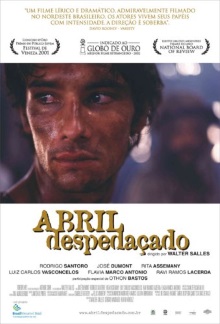
Hopefully this marks the start of a return to my usual posting schedule. Behind the Sun is another film by director Walter Salles, whose Central Station we watched only recently. They must have been part of a crop of South American works that my wife added to our list all at once. Interestingly, this one is based on a novel by an Albanian writer who set it in Albania. I guess Salles must have decided to adapt it for his native Brazil instead.
It’s the early 20th century and a family of four is embattled in a bitter feud with a rival family over the land they occupy. The young adult Tonio is informed by the harsh father that the blood on the shirt of the deceased eldest brother has turned yellow. This is taken as a sign that it is time for Tonio to seek revenge for his father’s killer. The mother is distraught but seems resigned that this is how things are and how they will always be. The youngest son who hasn’t even been given a name by his parents seems to want Tonio to defy their father. Still, Tonio obeys his father and guns down a member of the rival family who we see is more prosperous and numerous. The next day, Tonio asks to be allowed to attend the wake and does so. He asks for a truce from the patriarch of the rival family who says he will accorded the same agreement: one month until the blood on the shirt turns yellow. Meanwhile a man and a young woman who turn out to be circus performers travel through the area and befriend the two brothers, offering a glimpse of the wider world beyond their family’s feud.
One thing I was down on about Central Station is that it’s a bit too much of a feel-good film. It’s hard to have that same complaint about Behind the Sun. The tone here is unrelentingly grim, the arduousness of the family’s daily routine accentuated by the detailed step-by-step depiction of how they toil to turn sugar cane into blocks of sugar. The fact that the two sons have never been to anywhere else and have never known any other sort of life also reinforces the pointlessness of the generations old feud. One brilliant touch is here is that much of the film is seen through the eyes of the youngest son who is still able to experience some joy despite how seemingly hopeless their lives are. When the performers give him a book, he takes it to heart despite his inability to read and uses it to imagine a different and better life far away from the present in which death constantly lurks in the background.
I recently read a note in an unrelated novel about how traditional agricultural societies are the most conservative of all as they constantly on the knife edge of famine and any change at all is a grave risk. I guess that’s one explanation for why these two families cling to their traditions of honor and an eye for an eye in spite of all sense. The surviving son of the rival family even notes that he could easily gather up some people and wipe out the other family entirely and end the feud once and for a while. But the other patriarch insists that so long as he lives, they will act as they were taught by their grandfathers and only take as much blood as have been taken from them. I’m not sure how realistic this is, but this image of being trapped in a deadly and endless cycle is a powerful one.
My wife thinks this is an unexceptional film but I think that’s probably being too demanding. There’s some great camera work going on and the little touches like the youngest son’s book show some flair for telling a good story. All this is enough to elevate this into the respectably good category in my opinion.